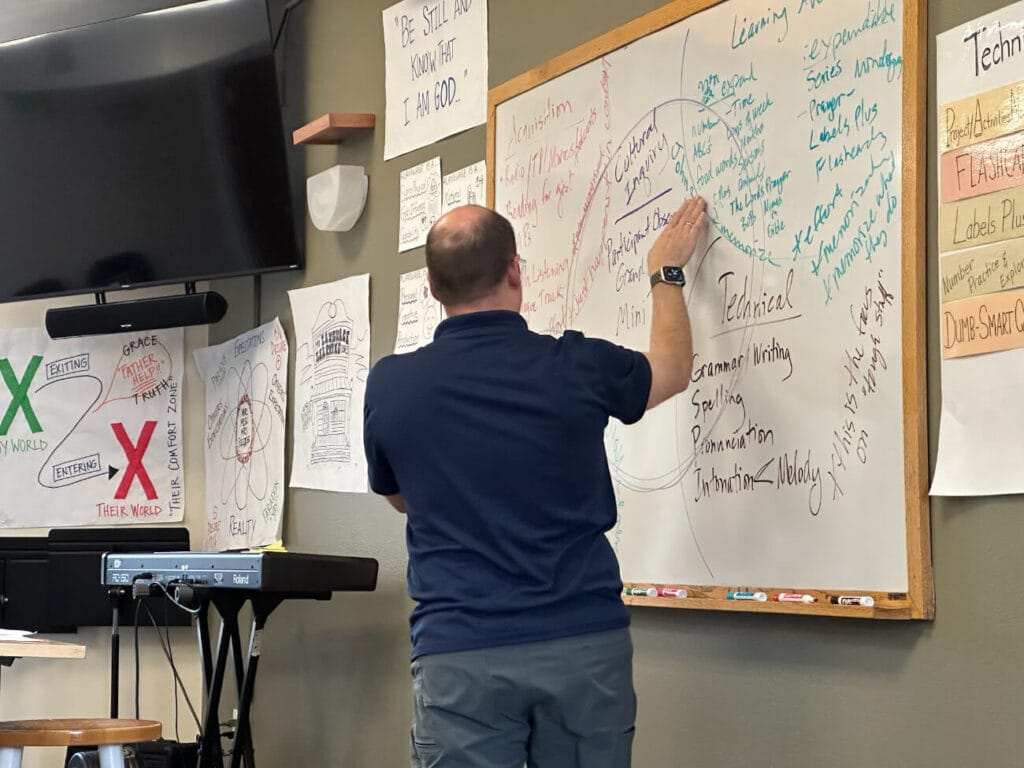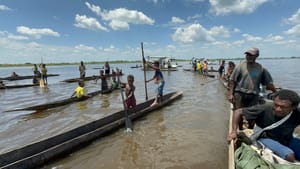Acculturating
noun
- The modification of the culture of a group or individual as a result of contact with a different culture.
- The process by which the culture of a particular society is instilled in a human from infancy onward.
- The process of adopting and assimilating foreign cultural elements.
We just finished up the Compass program at Mission Training International. It's a pre-field training program meant to help new missionaries prepare themselves to serve long term. We've learned a ton of stuff.
I used to think that the only preparation you needed to be a missionary was an appetite for misery and a one way plane ticket. I’ve been discovering that I’m a little ignorant of reality, which probably doesn’t surprise you, but it did me. And really, we would never go to war with a physical enemy without some training and yet when it comes to wars regarding the spiritual realm, we find ourselves wandering through the enemy’s minefields towards their trenches and machine gun nests, whistling in ignorance.
Yes, there are other missionaries retreating from the frontlines all shot up, bloody, and not looking very spiritually fulfilled at all but that’s probably just because they didn’t have enough faith. Since I have more than enough faith, I don’t bother asking them what went wrong. If that's you, you won't last long. It's all of us, if we're honest. We're taught to be self sufficient from little on up. MTI's mission is to pull the sunglasses of ignorance off of your eyes and prepare you for what's coming, even if we don't want to look.
I wasn't thrilled about going to MTI. Reaching into the depths of my soul and pulling up emotions, kind of like bobbing for apples and inspecting them for worms, isn't something I find that fun. But I also knew that I wasn't feeling very prepared for the journey that lay ahead of us. Some training might be good. So with mixed emotions we found ourselves in a classroom in Colorado.
So how does MTI decide what you need to know before you leave for the field? It’s quite clever actually. In addition to their pre-field training called Compass (like we were doing), MTI also runs a debriefing class for missionaries returning from the field. Did you know that most missionaries say that leaving the field and coming back to America is the hardest transition they’ve had - even harder than their first few years on the field! As MTI listens to the stories from missionaries coming off of the field, they quickly figure out the things that make it or break it for missionaries. Then they take this information and use it to build their curriculum for their pre-field training.
Another reason the training is effective is that the people teaching it have all experienced it. They have all been on the foreign field and have first hand stories of successes and failures from their own past. This helps show the relevance of what they’re teaching using both humor and tragedy, two of the best teaching tools. Anything is more digestible if it's wrapped in a warm tortilla of humor or tragedy.
So what did we learn about? The first two weeks we had language acquisition classes. One of the biggest barriers to missionaries reaching their host culture is, obviously, language. But culture is a big barrier as well. This includes things you might not expect; things we don't even think are cultural. Things like the way you wave to someone, how you count with your fingers, winking, holding hands, or even nodding your head "yes" and "no" can all mean entirely different things across cultures. If we aren't willing to exit our culture and enter our host's culture, we'll never reach them with the message we're trying to convey because we'll be stuck using our cultural references as a delivery vehicle. The message will be lost. So we were learning how to convey the message without tainting it with the messenger.
Since learning language is so critical, we were taught how to run through Language Acquisition Projects (or LAPs) while using a language helper. The idea with LAPs is that we, the learners, direct the lessons, not the teacher and so we learn faster. And instead of simply memorizing vocabulary and learning grammar, we focused on listening to the local dialect and comprehending it first. This method helps us speak without an accent. It's more important to sound like the locals than it is to get the language technically correct. The locals, after all, don't care if you're technically correct as long as you sound "normal" to them. And this makes sense in our context too, if you think about it. If someone came to you and spoke technically perfect English, but accented the wrong syllables and never used any slang, you'd pick it up right away. As such, LAPs are designed to help us integrate into the culture by understanding the local dialect quickly and eventually being able to speak it fluently.
We had a notebook full of different projects meant to help immerse us in the language. A sample project would be something like this: We'd draw a hospital, a school, an airport, and a train station on a piece of paper. Then we'd point to each location and the helper would say the word for it in her language. After a bit, we'd test our comprehension by getting the helper to say the location in her language and then we'd point to whatever location she referred to. After we seemed to have a shaky grasp on that, then we'd make some cards featuring, let's say, a bus, a train, an airplane, and a bicycle on them. We'd place one of these cards on top of one of the locations we had drawn and then the helper would to tell us in her language, for example, "I took a train to the airport." After we had an even shakier grasp on those sequences, the helper would test us by saying a phrase in her language and then we'd have to point to what she rode and where she rode it. We eventually added more pronouns, times of day, etc. In this way we could simulate situations without ever leaving the room and immerse ourselves in the language using scenarios we'd most likely encounter.

In order to test these LAPs out in the real world, we split into groups and were assigned a volunteer language helper from the neighboring community whose first language wasn't English. Then we were to run through some projects and try this thing out. Janice and I were in the group assigned to learn Vietnamese. Our language helper moved to America in her adult life with her husband and so she knew the Vietnamese culture really well. Having a window into that culture was fascinating. Really though, It wasn't important for us to learn Vietnamese, we just needed to learn the LAPs learning method. It was amazing how much we actually retained but the exercises were pretty realistic since we all started laughing, blushing, feeling stupid, and generally butchering the Vietnamese language. More than once we found words that were spelled the same way but if the last syllable had a rising tone it meant bathroom or something like that, but if it was a falling tone it meant chalkboard, for example. You can imagine the confusion that could result from a newcomer mixing these up and asking to write on a bathroom or needing to poop in a chalkboard. Our instructors gave many humorous and tragic stories on unintended messages they or people they knew conveyed to unsuspecting nationals.
After a week and half of these projects I hit a wall of frustration. I found the LAPs confusing and I didn't remember half the words I felt like any normal person should have. My mood snowballed like a bad skier flipping head over heels down a double black diamond. Even the experienced skiers on slope got swept away with the avalanche. I was close to getting in the van and driving home, whether or not my family came along. Janice sensed something was wrong. "You feel like a simmering volcano," she said. I shot smoke out of my nostrils and sighed.
Like I normally do when I face a crisis, I went on a walk, away from people who were trying to make me feel better. I wanted to marinate in my misery for awhile yet. After all, maybe I'd get hit by a meteor and all my problems would go away. As I was walking I began to realize that there were a lot of emotions swirling around inside of me (like magma in a volcano) and I didn't know how to identify them. I was emotionally illiterate. I began thinking about what we had learned up to that point and a quote from one of the instructors came to mind: "Emotions are like flagpoles on a golf course. Their purpose is to point us to something else. They're telling us there's a something worth noting under them." I began to evaluate myself, tracing my feelings back towards the point of origin and a pattern emerged. I'm not good at struggling. I avoid things I'm not good at. I don't like failure. Why I was dealing with pride! Such a sinister sin. It can disguise itself as a bunch of other things. I didn't like feeling like I wasn't smart. I didn't like failure in my face. I wanted to run away. Instead, since we were at 7,000 foot in elevation, I sat down on a bench and said between puffs, "Well, what do you know?" out loud to nobody in particular. I had just used bad emotions in a positive way. Up until then I dealt with emotions (especially bad ones) by stuffing them into a suitcase, wrapping them in chains, and throwing them in the deepest body of water I could find and hope that they didn't get discovered by the authorities (usually my wife). But this time I sorted through the mess and found a sin hiding under there. I feel like an emotional toddler who just took a first step in the right direction.
And do you know what? The LAPs actually went pretty well after that.
That wasn't the end of the emotional digging since, as they like to put it, Your baggage doesn't stay in the States! You take all your problems from home with you to the mission field, and then a magnifying glass is held over them. So a lot of what we went through was designed to help us cope emotionally with long term, unrelenting stress.
One day in class they asked us how many emotions they think we're capable of having. I counted to four and declared that was my answer. Imagine my surprise when the answer was, like, 67 or something! Who knew?

Kids definitely feel the effects of stress as well. The children's program at MTI is called CHIPs. The children are split into different classes based on their age groups. Oliver, Elliot, and Adi were in different classes. The neat thing about the MTI program is that the kid's curriculum mirrors what the adults are learning, just broken down into simpler concepts. In fact, sometimes the children's lessons find their way upstairs to the adult's class because even adults like simple object lessons. Our lessons were paced together so we could process as a family what we were learning. The CHIPs program is exceptional but Adi can be a particularly stubborn child if she doesn't want to communicate. This led to a lot of frustration as we tried to process with Adi what she learned. I began asking questions. How do I get this stubborn child to communicate what she's feeling? I preached to Adi about the values of processing emotion. I pried her like treasure hunter prying a clam in search of a pearl. I might as well been prying open Fort Knox with a spoon.
Later in the week we had some classes on confrontation, which Janice and I looked forward to like a death sentence. I know I avoid confrontation and I knew they would say that's bad and I knew I probably wouldn't argue because, well, that would be confrontation. They gave us a checklist and told us to evaluate ourselves and figure out which type of personality we were. In the model we used there are five different personality types; An owl, a fox, a lion, a teddy bear, and a turtle. After we evaluated ourselves we split into groups based on those personalities and set up some scenarios to encourage confrontation (not like punching or anything, just constructive criticism). I learned some stuff about myself. Apparently I'm a "turtle." Janice said that makes sense, since they're slow. Turtles also hate it when people pry at them like a treasure hunter prying a clam in search of a pearl. The harder you pry, the harder the clam clamps. The more we retreat into our shell and silently resent you for not going away. We need time to think and process. And apparently Adi is just like me. Once again I sat down and said to no one in particular, "Huh! What do you know?" The more I learn about myself, the more I learn about my daughter. She's just like me. Poor kid.
So how do we get this turtle to come out of its shell? Well, Adi is a very visual person (just like me) and so one thing they used in the CHIPs program was the Feelings Bears. The Feeling Bears are a set of flash cards each with a picture of a bear on them. The bear is demonstrating various feelings using nonverbal body language. Sadness, loneliness, anger, frustration, etc. So instead of getting Adi to describe some complicated feeling using only the vocabulary of a five year old, she can sort through the cards and just point to a bear. I immediately know what she's feeling and we can work it out from there. Adi learned to use the cards in class and so she actually prefers to use them. We're taking these cards with us as we transition to a new culture. I'm sure we'll need them!

Another emotional processing tool they taught us is the analogy of a pair of ducks. On one hand, we can feel super excited to be moving to a new country. We call this a "Yay Duck." But, at the exact same time we can feel really sad to be leaving all our friends behind. This is a "Yuck Duck." Experiencing them at the same time is a paradox, or "pair of ducks." So often we try to only feel one and ignore the other, especially since we're supposed to be super spiritual missionaries, but this pair of ducks often swim right beside each other. So now each night before bed we review the Yuck Ducks and Yay Ducks of each day, acknowledging that we are allowed to feel both. It's one way of getting our kids to process their emotions so they don't build up and explode all over the rest of the family. Although chances are that by bedtime it's too late anyway.
A lot of teaching centered around how to raise Third Culture Kids (or TCKs). When you take a child from one culture and move them to another, they never actually fully transition to the new culture. And yet, they've changed so much they don't fit in with their passport culture either. They're a third culture somewhere in between. It's like mixing blue and yellow paint. You don't get blue or yellow, you get green. It's a third color. That's what Adi, Elliot, and Oliver will be experiencing while we live in Papua New Guinea. When we come back on furlough, chances are they won't know how to fit in with children in the States. Yet, they don't fit in with kids in Papua New Guinea either. That causes a certain amount of stress and identity crisis and a lot of parent coaching was done on how to relieve some of that tension.
Both Janice and I feel that MTI was worth it.
We learned far more than that, but I feel I've already bored two of the three people who read my blog. We drove straight from MTI to Michigan to celebrate Thanksgiving with Janice's family giving us over 800 miles of highway to practice healthy confrontation and stress management. I wrote this to piece to help myself process what I've learned and to help our supporters understand a little bit about what we've learned. After all, your investment is helping us get this done and we appreciate that very much!






